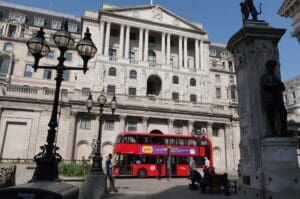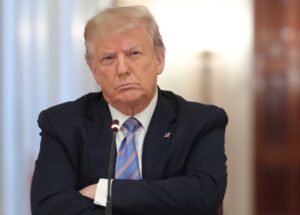When people speak of “social justice,” they are not speaking of justice in any historical form but rather an imaginary state of affairs in which the state enforces a progressive view of equality. F.A. Hayek wrote that “social justice” is “wholly devoid of meaning or content.”
May 6, 2025
UK consumer confidence has dropped to its lowest level since the peak of the cost of living crisis in December 2022, as households feel the strain of Donald Trump’s new tariffs, the ongoing war in Ukraine, and a raft of domestic tax and price increases, according to new data from Which?.
The consumer group’s latest confidence tracker fell by seven points to -53, reflecting widespread concern over both the economy and personal finances. Nearly two-thirds of consumers (64%) believe the UK economy will deteriorate over the next year, while just 11% are optimistic it will improve.
The data mirrors other warnings about rising anxiety among UK households. According to GfK, April brought a “perfect storm” of pressures including higher utility bills, council tax, road tax, and stamp duty, compounded by global instability and fresh concerns about inflation rebounding due to Trump’s trade policies.
The survey, conducted in the month to 11 April, found that 67% of people blamed their pessimism on global events like the Russia-Ukraine war and Trump’s reciprocal tariffs, while 63% cited rising prices, and 60% pointed to UK government tax changes.
Household financial outlooks also deteriorated sharply, with confidence in future household finances dropping by 10 points to -19 — the lowest level since July 2023. Confidence in current finances also fell by six points to +21.
Roughly 1.9 million households missed at least one essential payment in April, including rent or mortgage payments, utility bills, or loan repayments. The rate of missed rent payments rose to 4.7%, reflecting the continued squeeze on tenants.
An estimated 13 million households (46%) were forced to make at least one financial adjustment in the past month to cover basic costs like energy, housing, groceries, school supplies, or medicines. These adjustments included cutting back on essentials, dipping into savings, selling belongings, or taking on debt. While slightly improved from 51% in March, the figure remains high.
Rocio Concha, director of policy and advocacy at Which?, urged the government to take action to restore confidence and shield consumers from predatory practices.
“Consumer protections give people the confidence to spend,” she said. “Whether it’s rooting out online fraudsters, taking down rogue traders or tackling misleading business practices, the government must do more to place consumers at the heart of its plans to grow the economy.”
With Trump’s tariffs threatening to push up prices on imported goods and further disrupt global supply chains, analysts fear the current slide in confidence could worsen. The International Monetary Fund has already cut its UK growth forecast for 2025, and the Office for Budget Responsibility has warned of potential tens of billions in lost output if global trade tensions escalate.
As millions of British households remain on tight budgets, the path to economic recovery may depend as much on rebuilding consumer trust as on taming inflation or boosting GDP. For now, the outlook remains clouded by both international uncertainty and domestic policy decisions.
Read more:
UK consumer confidence plunges to lowest level since 2022 amid global and domestic pressures
A diverse group of British companies — from ex-offender employers to luxury shoemakers — have been recognised in the 2025 King’s Awards for Enterprise, highlighting the entrepreneurial resilience and innovation powering the UK economy.
In total, 197 organisations were honoured this year across four categories: international trade, innovation, sustainable development, and promoting opportunity through social mobility. The King’s Awards — formerly known as the Queen’s Awards — are now in their third year under King Charles III, and their 59th year overall.
Among this year’s most inspiring winners is Social Pantry, the London-based catering company that has quietly employed 42 prison leavers over the past decade. Founder Alex Head, 39, said she once feared telling clients about her inclusive hiring but now sees it as a strength.
“When I first did it, it definitely deterred business. So it’s really great that a decade on it’s been recognised by somebody as important as the King.”
Head hopes the award will inspire others to adopt similar social hiring practices: “If it’s being recognised by the King, then it’s something worth considering.”
Innovation, sustainability and social conscience celebrated
Tech company Yoto, known for its screen-free audio devices for children, picked up an award for innovation. With storytelling cards voiced by the likes of Olivia Colman and Tom Hardy, and backed by Sir Paul McCartney, the company sold over £51 million in devices in 2023.
Co-founder Ben Drury, said: “We didn’t shy away from the challenges — including a major product recall. We did the right thing for our customers, and we’re proud the award recognises that resilience.”
Brompton, the UK’s iconic folding bike maker, received its first King’s Award for sustainable development, following previous wins for innovation and exports. The honour comes as the cycling industry weathers a difficult downturn. CEO Will Butler-Adams said:
“This award couldn’t have come at a better time. Things like the King’s Award just make everyone feel good — you need to find things to celebrate when times are tough.”
Gibsons, the 106-year-old family-run jigsaw puzzle maker, was recognised for its sustainable packaging efforts, which include removing shrink wrap and switching to vegetable inks — a change that saves 500,000 metres of plastic a year.
Managing director Kate Gibson, great-granddaughter of founder Harry Percy Gibson, said: “We had this whole project about making the jigsaw puzzle perfect for the customer — and the planet.”
Watford-based Sole Bliss, maker of stylish shoes for women with bunions, won in the international trade category after posting £3.6 million in US sales last year. Its fans include Oprah Winfrey, Dame Helen Mirren, and the Queen, who personally recommended the shoes to Mary Berry.
Founder Lisa Kay credited customer service and recommendation as key to the brand’s US success: “These people might be famous but they’re not so different from us — recommendation is always great.”
The awards come at a challenging moment for UK businesses facing rising costs, international trade pressures, and political uncertainty. But for the winners, the King’s Award provides both recognition and momentum — a prestigious seal of excellence that carries weight in global markets.
Butler-Adams of Brompton recalls the impact of winning a Queen’s Award in Japan: “Our Japanese distributors were distraught when we let our last award lapse. These royal endorsements really do mean something abroad.”
With King Charles placing an emphasis on sustainability and social responsibility, the 2025 winners reflect a Britain where innovation, inclusion, and environmental integrity are becoming increasingly central to business success.
Read more:
From caterers to shoemakers: British businesses honoured in 2025 King’s Awards for Enterprise
UK interest rates are expected to fall at their fastest pace since the 2008 financial crisis, as the Bank of England prepares to respond to mounting global economic headwinds driven by President Trump’s escalating trade war.
Economists expect the central bank to begin cutting rates next week, lowering the base rate from 4.5% to 4.25%, with predictions of as much as a one percentage point drop over the next six months. That would mark the sharpest half-year decline since 2008, when rates tumbled from 4.5% to 0.5% in response to the global financial crash.
The expected cuts come amid fears that Trump’s protectionist policies — including a baseline 10% tariff on all imports, a 145% tariff on Chinese goods, and levies on cars and metals — will hamper UK growth and threaten economic stability.
Mortgage relief and falling borrowing costs
The rate cuts are already having a knock-on effect in the mortgage market. Lenders including Barclays, HSBC, and NatWest have reduced fixed mortgage rates this week by up to 0.25 percentage points, with many two-year fixed rates now below 4%.
For homeowners with a £200,000 mortgage, this means an annual saving of around £564. The Financial Conduct Authority estimates that 1.68 million households have fixed-rate deals expiring this year.
Race to cut: Economists call for urgency
Banks including Morgan Stanley, Barclays, and UBS are now forecasting a series of rapid cuts through 2025:
• Morgan Stanley expects the Bank to cut rates by 0.25 points at each of the next five meetings, reaching 3.25% by November, and potentially dipping to 2.75% in early 2026.
• UBS says the Bank may shift to cutting at every meeting, not quarterly, if Trump’s tariffs significantly depress UK trade and growth.
• Barclays’ chief UK economist Jack Meaning also anticipates four back-to-back cuts, highlighting the Bank’s readiness to boost growth amid rising global volatility.
The Bank of England will also update its economic forecasts alongside Thursday’s announcement, with expectations of downgrades to both growth and inflation projections. The most recent forecasts from February projected just 0.75% GDP growth in 2025 and peak inflation of 3.75% in the summer.
Government officials have cautiously welcomed the prospect of lower rates, suggesting the cuts are only possible because of fiscal discipline under Chancellor Rachel Reeves, who resisted increasing borrowing in her spring statement.
A senior government source said the US Federal Reserve now had “less room to manoeuvre” on rates because of the inflationary impact of Trump’s tariffs, giving the Bank of England a relative advantage.
The International Monetary Fund has cut its UK growth forecast for 2025 from 1.6% to 1.1%, citing global trade tensions. The Office for Budget Responsibility has warned that a full-blown trade war could wipe tens of billions from the UK economy.
Bank of England Governor Andrew Bailey and Deputy Governor Clare Lombardelli have both expressed concern in recent weeks about the impact of protectionism. Bailey said in April:
“Trade does support growth … fragmenting the global economy would be bad for growth.”
Lombardelli added that tariffs could “depress” UK expansion.
While Trump has delayed some of his reciprocal tariffs until July, his administration has signalled that sector-specific and country-based exemptions could still be negotiated — leaving businesses and policymakers grappling with continued uncertainty.
Though the UK economy faces a fragile outlook, the expected rapid fall in interest rates will offer meaningful relief for mortgage holders, businesses and consumers. But the pace and extent of recovery will hinge on global stability — and whether Trump’s trade policies escalate or ease in the months ahead.
Read more:
Interest rates set for sharpest drop since 2008 crisis as Bank of England prepares rapid cuts
The US economy shrank by 0.3% in the first quarter of 2025, marking its first contraction in over two years, as businesses rushed to import goods ahead of President Trump’s sweeping tariff plans, triggering record trade imbalances and unsettling financial markets.
The latest data from the US Bureau of Economic Analysis (BEA) shows the economy sliding into negative territory after 2.4% growth in the final quarter of 2024, and performing worse than the 0.2% decline expected by analysts. It follows a frenzied build-up of imports, which surged 41.3% on an annualised basis as companies moved to stockpile goods ahead of new tariffs.
Because imports are subtracted from GDP in national accounting, the record goods trade deficit in March weighed heavily on growth, even as underlying domestic demand remained relatively stable.
“Importers desperately tried to bring in as many goods as possible ahead of tariffs,” said James Knightley, chief international economist at ING.
“This surge now appears to be reversing, which could give a boost to second-quarter GDP,” added Paul Ashworth of Capital Economics.
Despite the contraction, Wall Street showed resilience. After opening sharply lower, the Dow Jones closed up 141 points, with more muted gains for the S&P 500 and a slight drop for the Nasdaq, which recovered from steeper early losses.
Trump’s aggressive “reciprocal tariff” plan, announced on April 2, has cast a long shadow over the US and global economy. Although implementation of the full package has been delayed by 90 days, the administration has retained a 10% blanket tariff, a 145% charge on Chinese goods, and levies on sensitive imports including cars and metals.
In a Truth Social post, Trump denied that tariffs had caused the contraction:
“This is Biden’s Stock Market, not Trump’s… This will take a while, has NOTHING TO DO WITH TARIFFS… but when the boom begins, it will be like no other.”
However, investment banks including JP Morgan, Goldman Sachs, and BNP Paribas have all downgraded US growth forecasts. JP Morgan has now placed a 60% probability on the US slipping into recession.
Adding to the drag was a decline in government spending, linked to cuts overseen by the Department of Government Efficiency (DOGE) under Elon Musk, which has reduced public sector headcount.
Further complicating the outlook, inflation pressures are building. The core personal consumption expenditures (PCE) index, the Federal Reserve’s preferred inflation gauge, rose to 3.5% in Q1, up from 2.6%, and significantly above expectations.
Though monthly PCE data is more closely tracked, the quarterly jump signals that inflation was already accelerating before the steeper tariffs hit in April — potentially limiting the Federal Reserve’s room to cut rates.
In contrast, the eurozone economy posted 0.4% growth in Q1, beating forecasts and helped by aggressive interest rate cuts from the European Central Bank and the announcement of a €500 billion investment plan by incoming German chancellor Friedrich Merz.
Germany returned to growth, expanding by 0.2%, and France narrowly avoided a technical recession with 0.1% growth. However, analysts warn the boost may be temporary.
“The report does not take into account the ‘Liberation Day’ shock and the significant uncertainty that follows,” said Christophe Boucher, CIO at ABN Amro Investment Solutions.
Trump has indicated that the EU will face a 20% import tax under his full plan, though for now the bloc is only subject to the 10% baseline tariff.
With growth slowing, inflation rising, and trade policy in flux, economists say the Fed and global central banks face a tough balancing act. Meanwhile, the Bank of England is expected to begin cutting rates rapidly to offset the global drag from tariffs.
The US downturn — however temporary — underscores the real-world risks of protectionism, even before the bulk of Trump’s tariffs fully take effect. Whether Q1 proves to be a blip or the start of a broader slowdown may depend on whether further trade escalation is avoided. For now, uncertainty remains the only certainty.
Read more:
US economy contracts for first time since 2022 as Trump tariffs unsettle markets
Ministers will hold a high-level meeting with leading bank executives on Tuesday as pressure mounts on lenders to improve access to credit for small businesses, amid growing fears that the UK’s economic recovery could be held back by underinvestment in the SME sector.
Senior figures from HSBC, NatWest and Lloyds will attend the talks to explain how they plan to support the government’s growth strategy, particularly through increased lending to small and medium-sized enterprises (SMEs). The meeting comes just days before the government concludes a major review into SME finance access, which could lead to new regulatory obligations for banks.
Rachel Reeves, the chancellor, has raised concerns that restrictive lending practices by high street banks — including the requirement for personal guarantees and centralised decision-making — are hampering small businesses’ ability to invest and grow.
“The last few years have been incredibly difficult for business,” said a government spokesperson. “That’s why this pro-business government is determined to improve the total business environment, including for small businesses.”
Government data shows that just under 50% of SME loan applications are approved — down from 67% in 2018. The Department for Business and Trade (DBT) said the drop raises “questions as to whether these rejection rates are too high and why this may be the case.”
Many small businesses have turned to high-risk private lenders after being turned down by banks, prompting further concern about the financial resilience of the SME sector, which is crucial to UK jobs, exports and innovation.
Representatives of the banking industry are expected to argue that they are willing to lend more, but that higher SME risk profiles make this difficult under current conditions. They are likely to call for an expansion of the British Business Bank’s loan guarantee scheme, which currently underwrites 70% of qualifying loans.
Trade group UK Finance has pushed for more government funding to support this guarantee, saying it is the only way to scale up SME lending safely.
The meeting will be chaired by Gareth Thomas, minister for small businesses, who has been outspoken about the loss of personal relationships between banks and SMEs. He has criticised the shift to online-only loan applications and is reportedly interested in expanding mutual lenders, which play a key role in SME lending in countries like Germany.
Thomas’s frustration reflects findings from a 2023 Treasury committee report, which accused the sector of “damaging” banking practices and harmful financial regulation. It highlighted the closure of 140,000 SME bank accounts last year, often without clear explanation — a practice labelled “debanking” by critics.
The report concluded that SMEs, already weakened by high inflation, energy price shocks, and pandemic-related disruptions, are now facing unnecessary barriers to finance that risk stifling innovation and long-term growth.
As ministers prepare to wrap up their finance review, the upcoming meeting may be a pivotal moment in determining whether voluntary reforms from the big banks will be sufficient — or whether more robust intervention is on the horizon to ensure small businesses can access the funding they need to grow, export and compete.
Read more:
UK ministers to meet bank bosses over small business lending amid access and ‘debanking’ concerns
Shares in major US streaming platforms and film studios fell sharply on Monday following President Trump’s surprise announcement that he plans to introduce 100% tariffs on films produced abroad, reigniting concerns over the disruptive reach of his trade policies.
Netflix shares slid 1.7%, Amazon was down 1.5%, and both Warner Bros Discovery and Paramount Global dropped more than 1% in early afternoon trading. The Nasdaq index, heavily weighted toward media and tech stocks, was off 0.6% as investors weighed the implications of a tariff that could drastically reshape the economics of Hollywood.
The president’s Truth Social post said he had ordered the Commerce Department and US Trade Representative to begin implementing the new levy, but provided no details on how it would be applied — including whether it would target streaming content, theatrical releases, or if the tariff would be calculated based on production costs or revenue.
A significant portion of US-produced entertainment is filmed abroad to take advantage of tax breaks, lower labour costs, and specialised post-production hubs. Netflix, in particular, relies heavily on an international production network to cater to its global subscriber base.
“The problem is that pretty much all the studios are moving tons of production overseas to reduce production costs,” said Barton Crockett, media analyst at Rosenblatt Securities. “Raising the cost to produce movies could lead studios to make less content.”
Film locations such as the UK, Canada and Australia — favoured for their incentives and skilled workforces — now face being penalised under Trump’s proposed plan. A survey by ProdPro found the top five preferred production locations for 2025–26 among studio executives were all outside the US.
Even this year’s Oscar-nominated films were largely produced overseas, underlining how deeply embedded international production has become in Hollywood’s business model.
Cinema operators also took a hit, with Cinemark down 2% and IMAX dropping 3%, as investors feared a knock-on effect on content supply and box office revenues.
“It doesn’t feel like something that will happen in the short term as everyone will be grappling to understand the whole process,” said Paolo Pescatore, analyst at PP Foresight. “Inevitably, costs will be passed on to consumers.”
The UK’s media and production sector could be among the hardest hit. The Bectu union, which represents tens of thousands of UK-based film and TV freelancers, urged the government to take swift action to defend the country’s £6 billion screen sector, warning that jobs and investment could be at risk if productions are repatriated to the US under tariff pressure.
“Tens of thousands of freelance jobs are on the line,” Bectu said in a statement. “The UK is a vital part of the global film production supply chain and must be protected.”
Hollywood’s 2023 strikes already raised the cost of doing business, securing better pay and benefits for writers and actors. Trump’s proposed tariffs could now add another layer of financial pressure, just as studios attempt to recover from months of halted production.
While the administration has yet to confirm the timetable or precise scope of the movie tariff plan, analysts warn that even the threat of protectionist policy is enough to deter investment and disrupt studio planning cycles.
For a sector already grappling with streaming competition, cinema recovery, and shifting audience habits, Trump’s latest policy salvo may force difficult decisions — and a possible scaling back of content creation altogether.
Read more:
US media stocks fall as Trump threatens 100% tariffs on foreign-made films
A massive power outage that swept across Spain and Portugal on April 28, 2025, has not only disrupted daily life but also sent shockwaves through the cryptocurrency sector, highlighting vulnerabilities in digital infrastructure and prompting discussions on regulatory frameworks.
The Blackout Unfolds
At approximately 12:33 PM CEST, a sudden drop in grid frequency from 50 to 49 hertz triggered automatic shutdowns of power plants across the Iberian Peninsula. The blackout affected mainland Portugal, peninsular Spain, Andorra, and parts of southwest France, leaving tens of millions without electricity for up to ten hours in most areas, and longer in some.
Critical infrastructure, including hospitals, transportation networks, and communication systems, were severely impacted. Spanish train operator Renfe halted all trains, stranding approximately 35,000 passengers. Madrid’s Barajas International Airport operated at reduced capacity, and telecommunications services experienced significant disruptions, with network traffic plunging to just 17% of normal usage.
Investigating the Cause
The exact cause of the blackout remains under investigation. Preliminary analyses suggest that “anomalous oscillations” in very high-voltage lines, possibly triggered by extreme temperature variations, led to synchronization failures across the interconnected European electricity network . Spain’s grid operator, Red Eléctrica de España (REE), reported a sudden loss of 15 gigawatts—roughly 60% of national electricity demand
While cyberattacks have been ruled out by REE, Spain’s top criminal court is considering whether the incident could be classified as a terrorism-related cyber-sabotage . The blackout has also raised concerns about the stability of electricity systems with high shares of variable renewable energy, as solar energy accounted for approximately 59% of Spain’s electricity supply at the time .
Impact on the Cryptocurrency Sector
The blackout’s effects rippled into the cryptocurrency sector, exposing vulnerabilities in digital infrastructure, and prompting discussions on regulatory frameworks.
Operational Disruptions
The power outage disrupted internet connectivity and data centers, affecting cryptocurrency exchanges and blockchain operations. Users reported difficulties in accessing trading platforms, executing transactions, and managing digital wallets. The incident underscored the dependence of the crypto ecosystem on stable power and internet infrastructure.
Regulatory Implications
In Portugal, the blackout has intensified scrutiny over the country’s approach to cryptocurrency regulation. Unlike Spain, which has embraced digital asset services, Portugal’s banking sector remains hesitant due to a lack of comprehensive regulatory frameworks. Major banks, including Caixa Geral de Depósitos and BPI, have cited regulatory uncertainty as a barrier to offering crypto services .
The blackout has prompted calls for the development of robust regulations to govern the crypto sector, ensuring consumer protection and financial stability. Experts argue that clear guidelines are essential for fostering innovation while mitigating risks associated with digital assets.
Market Reactions
Despite the operational disruptions, major cryptocurrencies exhibited resilience. As of May 6, 2025, Bitcoin (BTC) is trading at $94,501, Ethereum (ETH) at $1,805.51, and Cardano (ADA) at $0.663288. The stability of these assets suggests that the market has absorbed the shock of the blackout without significant volatility.
Looking Ahead
The Iberian blackout serves as a stark reminder of the interconnectedness of energy infrastructure and digital economies. As nations transition towards renewable energy sources, ensuring grid stability becomes paramount. Simultaneously, the incident highlights the need for comprehensive regulatory frameworks to govern emerging sectors like cryptocurrency.
For the crypto industry, the blackout underscores the importance of infrastructure resilience and regulatory clarity. As stakeholders navigate these challenges, collaboration between governments, financial institutions, and technology providers will be crucial in building a secure and sustainable digital economy.
Read more:
Blackout in Spain and Portugal: Ripples Felt in Crypto
- 1
- 2







